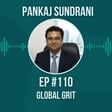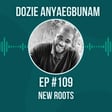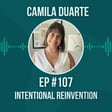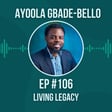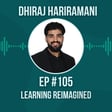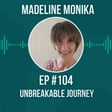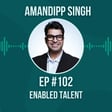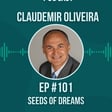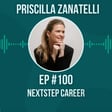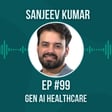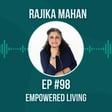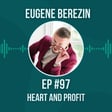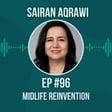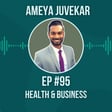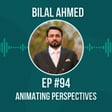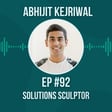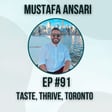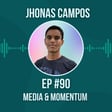Become a Creator today!Start creating today - Share your story with the world!
Start for free
00:00:00
00:00:01

#88 Endless Possibilities w/ Milad Nourvand
Originally from Iran. Milad is a second-time entrepreneur with expertise in tech and marketing. He is the co-founder of Behtarino, a thriving startup in Iran that scaled to 6 million monthly users and a team of over 80 employees.
In 2022, Milad relocated to Canada to pursue a second Master’s in Marketing and co-founded a healthcare startup during his studies. After a year of valuable insights from Canada's market, he shifted his focus to co-founder of LingUp, his current venture, which utilizes AI to help users improve their language speaking skills and achieve fluency more efficiently.
Recommended
Transcript
Meet Milad Norvant
00:00:31
findaway
Welcome, everyone. This is episode 88, Endless Possibilities, and today our guest is Milad Norvant. Originally from Iran, Milad is a second-time entrepreneur with expertise in tech and marketing. He founded Betterino, a thriving startup in Iran, and scaled to six million monthly users and a team of over 80 employees. In 2022, Milad relocated to Canada to pursue a second master's in marketing and co-founded a health care startup during his studies.
Founding Linga and Language Fluency
00:01:01
findaway
After a year of valuable insights from Canada's market, he shifted his focus to Linga, his current venture, which utiliz utilizes AI to help users improve their language speaking skills and achieve fluency more efficiently. Welcome a lot.
00:01:16
Milad
ah Thank you for having me.
00:01:18
Ingrid
So we'd like to start off asking about your business, but I'm actually curious. Um, I mentioned to you a little bit before, I love learning languages and, um, I think achieving fluency is the hardest part. I remember when, even when I first moved to Canada, you know, I was trying to, I was already fluent, but just trying to get the, like the pronunciation correctly. And it's harder when you don't have, like you're not immersed in the culture. So tell us more like, how did you get into this and like, what, what is your business? What is Linga?
00:01:46
Milad
ah Yeah, interesting thing is that, so I've learned English as second. So so I learned, ah I to speak four languages now. And when I was from, when I was elementary school, I started learning English because a lot of ah documents, a lot of ah science is actually written in English. So my parents pushed me toward learning English.
00:02:12
Milad
And after a while, I was ah able to read the English, listen to the English, but when when it comes to ah speaking it, I had a lot of trouble. And ah the the problem is that I was in an environment that no one was talking English.
00:02:31
Milad
So in order to speak, you have to activate a lot of words. So the the terminology is that you have a knowledge, which is tacit knowledge. So you know the grammar, you know the vocabulary, but those are passive vocabulary and grammar. So you understand them when you hear them or when you read them, but you cannot use them.
The Concept of Lingop
00:02:53
Milad
And when I came to Canada, actually it helped me being in the environment, being having a lot of English speaking friends helped me to improve my language. But I found that um like I know most of the parts, but I don't know what I don't know.
00:03:12
Milad
And ah that was the that that was ah first initial thought that I found a problem. Then I ah thought, maybe if we had something like Grammarly, but for speaking, and also which a service that helps, so so Grammarly shows you your mistakes, but what if if it has a place, library of mistakes, that I can go and review my mistakes, reflect on my mistakes and improve them?
00:03:41
Milad
And ah that's what was initial thought. And i then I talked with a lot of my peers and other international students and saw that they have the same problem. And even this initial solution that I i had in my mind, they all was like, I would love to have these types of solutions.
00:04:02
Milad
So that ah that was the initial like seed of the idea of Lingop, which is an AI language partner ah which talks with you in a natural way and helps you improve your speaking now in knowledge, your speaking a new language based on your speaking level and based on your knowledge in that language. And it's more like personalized AI companion.
00:04:34
findaway
Thank you for sharing that, Milad.
Lessons from a Failed Startup
00:04:37
findaway
You mentioned in your bio that you sent over to us that ah your first text startup tech startup failed after two years. What were the key lessons that you learned from that experience, and how did they influence your approach to venture you know future ventures, like Lingup, for instance? What lessons learned that and did you accumulate? And then now that you're applying to Lingup and the way you're taking the business ahead,
00:05:03
Milad
Yeah, so I had actually two, so my first tech startup was when I was studying my undergrad studies, and it was around 10 years ago, something like that. And at that point of time, I i actually was really new be into the business.
00:05:22
Milad
And I just gathered a couple of my friends. I said, OK, there is this problem we want to solve. And it was in the hard tech space. I was ah i but ah studying biomedical engineering.
00:05:31
findaway
No.
00:05:35
Milad
And we wanted to build a portable dialysis. And so people ah were suffering from that and we wanted to build a portable dialysis to help them to ah have this treatment over the night, other than going ah three times a week, four hours a day to to the hospitals or care centers to to get the dialysis.
00:06:01
Milad
And we worked on it, and our IP was stolen at that point of time. Some of our team members were actually ah hired with other ah research institutes, and they were trying to actually get our knowledge. And after a while, we lost everything we had built in two years.
00:06:22
Milad
And that at that point of time, I went into a like huge depression ah period, which I thought two years of my life and my friends. and We were a team of eight people. And my friend's life was ruined, and we don't have anything to show.
00:06:40
Milad
So, but but after that period, it was actually really good for me. Early ah failure was really good for me because I understand that other than science and technical aspects of the business, you have to know a lot of other things. And that was one major thing that pushed me
The Impact of an MBA
00:07:01
Milad
to work.
00:07:01
Milad
ah pursuing my MBA studies to learn, okay, you you have to know about IPs, you have to know about legal parts, you have to know about marketing, ah corporate structure, HR, and I know like ah NDAs, these types of car agreements, and um But but so so when I went to studying this, it was like I had the problem and I was like ah loving this knowledge. ah above that So I knew that this knowledge, if I had these, I would have been successful in my first venture. But yeah, that that that was a story behind that first failure.
00:07:46
Ingrid
I really, I really appreciate you telling us the story because first, I think it's important for founders to know there's so many founders that had a startup that wasn't successful before they had a big startup. The the book, I think it's called Super Founders Talks about this, right?
00:07:58
Milad
Yep.
00:07:58
Ingrid
And um it's like in talking about, you know, there are things that we didn't know and you learn from your mistakes. And I think we all do that. I remember I have a um ah company that's my mentee and I tell them You know, I would tell them something, they did they did it another way and they came back and I told them the same thing like I hadn't before.
00:08:16
Ingrid
And they were, you know what, Ingrid, you're very patient because you tell me the same thing that you already told me, even though we did the opposite. I'm like, it's fine. It's your company. I'm trying to help you not make the same mistakes that I and others did, but if you want to try and figure it out, it's fine,
Keys to Startup Success
00:08:29
Ingrid
right?
00:08:29
Ingrid
And sometimes you have to learn by yourself.
00:08:30
Milad
No.
00:08:31
Ingrid
So I'm curious now talking about the next company, which was Betorino, your previous company, is still not linked up, ah that you grew it to 6 million users with a large team.
00:08:37
Milad
Yeah.
00:08:42
Ingrid
So what were some of the key strategies that or decisions that helped you scale that started up successfully in Iran? And I think that's like, what do you think was like the the thing that made you, you know, it's like, okay, this is what I'm gonna, these are the mistakes I'm not gonna make this time kind of thing.
00:09:00
Milad
ah Yeah, that's actually really good. So, ah so of ah just to give you a bit overview, Beethany is like integration of Shopify and Yelp. So we had the ah we had the platform, a listing of ah local businesses, and people can come, search for the businesses, and then buy from them. And we had a lot of softwares around that.
00:09:23
Milad
POS inventory management, ah website builder, payment systems, and all of these for the local businesses. But ah when we start this, ah so the first thing I was looking for is that what ah what ah roles I want, what co-founders I need. So I looked for people who had complimentary skill sets to mine. And then I was looking for people who were and like 18. So I was actually looking for building 18. People like looking for, ah
00:10:01
Milad
uh, winning in the long term, not not in the short term such as like, uh, small results would make them happy. We would like building a system step ah from the first day we was, we wanted to actually building a system with millions of users.
00:10:16
Milad
And ah ah that ah that helped us to build a strategy to reach to that point. And it was really difficult ah first two years because you have to work and work and you don't see much of a result until you see it. And yeah, until to get into a product market fit area.
00:10:37
Milad
And yeah, but the best thing that happened was ah the co-founders that I had. I think I actually, when I was in the room with them, I thought I'm in a room with brilliant people, which which was really important for me. And then we had a complementary skill set. So for example, for the Web development part, I had a co-founder. I didn't think about ah that the development part anymore and I was focused on my own part and he was in the part of, ah he was actually focused on on his part. And b we we had daily meetings to get get on board and see what we can do.
00:11:16
Milad
And so, like, if you have a a team, you can delegate the tasks, and you don't have to be everywhere at every any time. And I think that was one of the main things that we learned and put into place in Beethoven.
00:11:33
findaway
I love that you mentioned successful partnerships and you having, you know, complementary co-founders and we see that we cannot stress this enough, you know, every experience that I've had. um Our partnership, me and Ingrid as well, we are so complementary to each other and that just, you know, makes it so much more fun to work for sure because you get to learn from each other on a daily basis.
00:11:47
Milad
Mm.
00:11:54
findaway
So thank you for pointing that out. Now, I'm curious, at least as an immigrant here in Canada, I've been asked so many times, why
Choosing Canada for Growth
00:12:04
findaway
Canada? And one of the best responses I love is like, why not to Canada, right? So my question to you is what motivated you to move to Canada and how did your time studying for your second master's in marketing impact your entrepreneurial journey?
00:12:20
Milad
ah Yeah, so I actually first I chose Canada as like ah one place that has a really good higher education, higher education studies. So after my second, ah ah so so after our success, in I know i I got the privilege to consult and being mentor for several startups.
00:12:44
Milad
And doing that, I found out that I i need to update my ah marketing research knowledge. So I wanted to know a more get into a field of research and marketing. And I wanted to actually be in the field of global markets. Because I already knew what we what we can do into the local market of Iran and even neighbor countries.
00:13:09
Milad
I wanted to vent global, and even we had some companies in Iran that wanted to go global, I worked with them, and I thought I have a gap in my knowledge in that area. And I chose Canada because of its... ah so So there were two reasons. and main The first one was ah the quality of higher education in Canada.
00:13:32
Milad
And the second was ah second one was, it's like it's a very welcoming country. So I know a lot of people that went to different countries around the world, and I talked with them. But Canada is like second all a second home, and sometimes it's actually a first home for immigrants.
00:13:54
Milad
And I actually got this advice from other people. And when I came here after a while, I felt that. And that's really awesome. I think Canada for entrepreneurs and anyone looking for a second home is like a perfect place. There are a lot of support, kindness, and these types of things from the people in Canada.
00:14:19
Ingrid
um I really second what you said when i when I decided to move to Canada, like for me it was also proximity to Brazil and Brazil time zone because I had lived in New Zealand before but basically you can't talk to family when it's like 16 hours but um having experience in the US s and other places like Canada is still and it's still such a welcoming place that I can completely understand where you're coming
Lingop's AI Advantage
00:14:43
Ingrid
from. So going back to LinkUp now, you mentioned a little bit why you decided to start the startup, right? I'm curious in how does LinkUp, you know, ah how does AI specifically in your use of AI transform the way that users achieve fluency? Give us a couple examples of like how it's helping people achieve fluency in specific languages.
00:15:08
Milad
Yeah, well right now we are actually in ah just providing English and we are going to add other languages pretty soon. But what we are seeing from people, it so so one main ways for people to practice speaking English was to find partners.
00:15:26
Milad
So we have other websites like platforms such as Tandem. ah they People go there and find ah partners. They look for the partners to to just speak the new language. But the problem with them is that they are becoming like a dating websites.
00:15:45
Milad
and And the problem with that is ah only 5% or 10% of the population can find partners. And it's more like talking. And there there are a lot of problems and challenges with it.
00:16:00
Milad
And we what we did, we tried to replicate that experience with AI. So we built a companion for people that they can talk anytime, anywhere about any topics they like.
00:16:15
Milad
And the results we found, we worked with some students in Brock University and University of Niagara Falls. And these students are actually loving this because other than basic English understanding, our companion is actually helping them to understand the nuances in culture.
00:16:39
Milad
So for example, ah what does double double mean in Canada? So that you you never learn about this, but when it when when it comes to this, they try to understand these types of nuances. So this is like coffee. You can go and order from Tim Hortons.
00:16:59
Milad
You don't go there. if If you want to talk like a native, you don't go there and say, I want to cover you. For example, say, I want double, double. Or you can understand what but that means if your friends are asking for that. And this is like helping them ah becoming or talking like ah native ah as a the time goes by.
00:17:22
Ingrid
I just want to add that I really appreciate this. So I am actually currently doing French classes through the IRTC program that they have the French for permanent residence. And just having the classes where I am forced to speak French, but at the same time, I know that for a lot of people, for example, my mom, when she moved to Canada, she, her English was fluent was because of her accent, and she was afraid of practicing it.
00:17:45
Ingrid
So having a platform like yours, people are able to practice without that social pressure of knowing if they're seeing it right or like being in in a business situation. So I just, I just wanted to say that I love it. I feel that I feel the problem deeply.
00:17:45
Milad
ye
00:17:56
Ingrid
And once the French launches, let me know. Cause I would love to use our platform, but I really like it.
00:18:01
Milad
Yeah.
00:18:01
Ingrid
Yeah.
00:18:02
findaway
No, and I have to share. ah Before moving to Canada, I came here on business trips like three or four times. And the first time I came, I actually went to um Tim Hortons and I asked for a regular coffee. But not that I knew and I didn't know at the time that a regular coffee in Tim Hortons is not just black coffee, it's the coffee with one sugar and one cream.
00:18:27
findaway
And then when I got him like, what's this dirty water in my face? I was hoping to get a black coffee. So for those that don't live in Canada, a regular coffee at Tim Hortons has one cream and one sugar and the double double has two creams and two sugars.
00:18:40
findaway
So just fun facts. And I love that you're doing this in the live.
00:18:43
Milad
That's right, yes.
00:18:44
findaway
two
00:18:45
Milad
And ah just just to ah actually expand on what ah you said in great so social pressure is actually really important in the education space.
00:18:45
findaway
um
00:18:53
Milad
So, um me and my co founder we have more than ah combined we have more than 15 years of experience in education industry. And so but one one main thing is that people, ah so so this social pressure pushes people into a lot of problems. So for example, they cannot, ah they they they feel that they are ah less intelligent in the new language and they don't talk with other people. They don't make friends. They don't get into communities. They become lonely. And even they don't know about their rights in the or country. And it it's its it actually pushes them into a lot of problems from health mental health. And also even when they came to when they go to, even ah we are talking with ah Niagara Falls Hospital, and the thing is that a lot of people, a lot of immigrants that go there, they cannot ah express their problems, their symptoms.
00:19:59
Milad
And ah so this language problem as a language problem is like a lot of problems that ah can stem from it and can ah can impact people's lives substantially from health, from mental health, from ah having friends, from getting into the communities and these types of even finding a career.
00:20:25
Ingrid
Um, I love that you mentioned the health part cause it reminded me of something I don't think I ever a shared here on this podcast. So I had the opportunity to talk to a paramedic here in BC and they were telling me how people that they have a service that they call to find people that speak the exact language that the person is speaking. Cause they don't speak English to be able to help them.
00:20:43
Ingrid
but how dangerous that can be sometimes because sometimes there was one case that he was telling me that it was a specific dialect of Chinese and they couldn't find the person, so like they were being passed from person to person to try to find the right dialect and the right person that could speak that language, especially for people that don't speak common, like larger, broader languages, it's even more dangerous.
00:21:02
Ingrid
just So you can really put them in a life threatening situation where they're not able to communicate the symptoms that they're having, especially in an emergency situation.
00:21:04
Milad
Yeah.
00:21:08
Ingrid
So it's, I really appreciate you pointing that out.
00:21:12
Milad
Right, yeah, effective.
00:21:14
findaway
Yeah. Ingrid and I, we both know firsthand that starting a business comes in a new country, comes with so many unique challenges.
Adapting to Canadian Business Environment
00:21:24
findaway
So I'm curious to learn in your experience, Milad, how did your experience as an entrepreneur in Iran prepare you for building startups in the Canadian ecosystem?
00:21:36
Milad
ah Yeah, that's a really good question. so ah and in iran so we ah We learned a lot from ah building a business in Iran, so I learned ah how to do ah human resource management, how to build the product, how to find the product market feed, how to scale that product.
00:21:57
Milad
But ah the problem that I didn't know when I came to Canada from the start was that I didn't know the legal system in Canada and how organizational ah organizations should operate in this system.
00:22:16
Milad
So for example, what what were the corporate structures? And i so you can ah learn about it with a simple search, but ah what was the and consequence of each corporate structure? but there There are a lot of tax consequences. There are a lot of benefits that you can get if you register as one corporate structure other than the others.
00:22:41
Milad
And that was one thing that I didn't know. The second one was that there are a lot of benefits and grants with government that in my first venture we were spending, I think I spent it around $20,000 on ah infrastructure costs.
00:23:01
Milad
And then we found out that we could have easily get sponsored with ah big corporations like Microsoft, AWS for part of that. And also we could get ah grants from my tax. He actually registered as a registered part of our business as research or, ah ah for example, our product development or market discovery part.
00:23:25
Milad
as research and we could have got some upgrades from my text. So I think ah So so they were the the learnings I had in Canada in the business space in space was ah two ways. The first one was ah the legal structure in the Canada, ah the privacy, the terms and conditions, and these types of things. And the second one was the benefits that you can get
00:23:56
Milad
And a lot of people are getting that can help you to improve and go faster. And I didn't know about them until I think year and a half starting the company.
00:24:08
Ingrid
um That's a really important point because I think that even when founders know that there are things that you can apply for, I come from a country that's so bureaucratic that everyone would tell like it's not worth it.
00:24:20
Ingrid
And here, when i had when I was working actively at Safety Docs, we had a couple grants that I applied. I was like, oh, this is so easy. Like some of them are very complicated, but some of them, it's just like, okay, they want this information and I got it right away. So not shying away from that and being really like, oh, this is how the system work and having the that support for sure. And that's a challenge to learn even like how, you know,
00:24:42
Ingrid
how to create a GSD account, how to pay the taxes, how to like make sure that you have all of that. I'm curious to hear, you mentioned a bit how what the role of your MBA was, the MBA they got at the university in Iran, and you also pursued a second master's here in Canada. How have they contributed to your intrapreneur success? like so What are some of the key learnings that you're like, oh, this really helped me move forward with my businesses and all of that?
00:25:10
Milad
Yeah, I think I'm actually a Lifeline a learner. I see myself as Lifeline ah learner and I try to learn a lot from different courses, different ah different articles online.
00:25:24
Milad
and I found my MBA in Mastering Marketing as like a comprehensive program that put a lot of different things into one place and you had to go there and at that point of time you said, okay, I have to actually finish this program and I have to work it intensively with other things that I'm doing ah to to to finish this program.
00:25:49
Milad
So it actually build some ah my built me some foundations of business. So it helped me to ah start my second venture and make it successful and then when I was comparing it with my first venture. And the mastery marketing in Canada actually helped me to see ah to to update my knowledge in the global marketplace.
00:26:17
Milad
So I had a lot of knowledge in a local marketing, local growth, but studying from Canada, having classmates from around the world, and having professors from around the world with wide range of experiences actually helped me to see ah my knowledge from other perspectives too. So it actually expanded my horizons, and I think if If I go back, I would do the same and I think it was invaluable ah invaluable experience.
00:26:55
findaway
Thank you for sharing that, Milan. I know that we go, you know, we have this advantage here in Canada of interacting with so many other incredible individuals from other amazing countries. But I am curious to ask you, um even though we're exposed to all this, you know, different culture and different habits, how do you maintain a sense of home or identity in your ah routine in amidst the changes in your life. What makes you feel close to home even though you're in Canada and this isn't your new home but your previous home? What are some of the things that make you maintain this sense of identity and that you do not want to lose?
00:27:41
Milad
Yes, so I always see myself as like citizen of world and I don't think that I belong to a specific country and I see home as people that we love and people that we surround ourselves with.
Building a Sense of Home
00:28:01
Milad
And ah even though I immigrated from Iran, I'm in a continuous relationship with my ah friends over there, my parents, and most of them are actually ah living across the world.
00:28:17
Milad
and um And also, I build a community of people that I really like in Canada. So I have a lot of friends, I have a lot of family members here, which I feel connected. I think that that that is what makes, ah that that that that is what ah It gives me the sense of home. In the early days of ah immigration, it was really hard. I think it's the same for everyone. Most of the people, not everyone.
00:28:53
Milad
And it was really hard for me because I was like, I had, I was homesick and I miss a lot of things about Iran. But after a while, when you build that relationships, when you build that ah community, I think ah that that feeling goes away and you you feel like that you are in a home or this is like your first or second home.
00:29:21
Ingrid
I like the idea of being a citizen of the world because I think right now I feel like Canada is really my home but for many years I felt like an in-between or like I went to visit Brazil I didn't feel like I was from there but I also didn't really feel I was from here like it was like that I know that a lot of immigrants live on that regard um I would love to talk about, you know, you started three incredible companies and you have so much like knowledge on that. And what advice would you give aspiring entrepreneurs who are considering a major, you know, career shift, like changing, like starting a new business in a new country, right? Because starting business a new business already isn't easy.
00:30:00
Ingrid
or anything like that, and especially those that are navigating new countries, new markets, what are some like, if you get had to get like two, three main points, ah like what would you wish you knew when you started?
00:30:13
Milad
and You mean ah what I wish knew I knew when I started the company or?
00:30:19
Ingrid
Yeah, no, like for aspiring entrepreneurs, if you're mentoring an aspiring entrepreneur, what are some of the, you know, what what advice would you give them?
00:30:29
Milad
Okay.
00:30:29
Ingrid
And we're starting that shift.
00:30:31
Milad
So I think it's like ah ah so entrepreneurship, in in my opinion, you you have to actually, ah so so it's like a lifestyle rather than a career path or something
Advice for Entrepreneurs
00:30:44
Milad
like that. So you have to love what you are doing.
00:30:47
Milad
So if you are getting advice from your friends or you're getting influenced by the media that entrepreneurship is the new cool thing. I think it's it's not ah you have to second, ah you have a second thought and ah think deeply that whether you are right for the past or not.
00:31:05
Milad
Because it's really difficult and it requires a lot of resilience, a lot of our persistence, and a lot of learning, a lot of late night working. And ah you have to love the journey and you have to sacrifice a lot along the journey.
00:31:23
Milad
So I think, ah so main point that I have, and I talk myself ah with myself about that too. So if you like this, if you love this, you'll have to do it. If you don't like it, or if you you're not passionate about this, and just just don't do it. And i there are a lot of other ways to make money or to make a good decent money the decent amount of money. And the second thing is that,
00:31:52
Milad
um one So the second is like a popular opinion is that talk to the users so ah and into the space that you can talk to a lot of users. For example, in my previous venture, Care Canada, we were in a space, I was an immigrant here with no connections, and we had to talk with a lot of medical doctors.
00:32:17
Milad
And getting access to those doctors, they they are super busy. And there are a lot of gatekeepers to get into them. And we had a really difficult time to find a doctor just to talk 15 minutes about their problems. And it was really difficult for us. And I was doing a lot of ah networking and these types of things just to have that 15 minutes with the doctor.
00:32:41
Milad
And it was really, so so it takes a lot of time to learn from them. And after a while, we found out that we don't we are not, ah there is no ah founder market fit in that area. And we cannot learn from the doctors in the speed in the speed that we are hoping to. And these are like two main things that comes to my mind right now.
00:33:06
Ingrid
I just want to point out that something extremely important, everything you said it was important, but it's the founder market fit as well. Because for example, when you're talking about healthcare startups, if you're not already from that world, the chances of you finding mentors and people that can support you because of how busy they are is so hard. So I think that's like having that consciousness and be like, Oh, there's no founder market fit. The idea might be great, but there's no founder market fit. You can bring a co-founder that might have that market fit or go to something else. And I think that's super important.
00:33:35
Milad
Yeah, that's right, yeah, yeah.
00:33:36
findaway
And I also love that you pointed out about the the journey being you know pleasant and doing what you love. And that was halfway through the journey, ah through the work. And that's why I'm going to hop onto the next question that as you know, we always ask the previous guests to leave a question to their next guest. And this one has a lot to do with what we were talking about. What would you be doing in terms of profession if you weren't currently in this particular one?
00:34:05
Milad
ah so Can you repeat this? because
00:34:07
findaway
Of course, what would you be doing in terms of profession if you weren't currently in this particular one that you are now?
00:34:14
Milad
Oh, right, okay. Because like, so so a lot of founders are like, ah so entrepreneurship is like ah not a profession. So ah you have to do a lot of things. And so so it's like, ah you yeah, you are, ah if there's if there is a fire, you are the person that goes you have to go and turn it off. But if I wasn't doing this,
00:34:44
Milad
I really like physics. So I would like to, if if I wasn't doing ah ah what I'm doing now, I would like to be a scientist in the physics and to just learn about the foundations of our universe. And I think that would excite me. Yeah, that would be a fulfilling, ah fulfilling experience for me.
00:35:09
Ingrid
ah you You just, again, focus on the problem solving. It's like, again, start up or company problems, let's go for universe. I love that. One thing that we love to ask, because I think that for entrepreneur entrepreneurs that you know, don't really have a
00:35:20
Milad
Oh.
Work-Life Harmony and Hobbies
00:35:25
Ingrid
work-life balance, or they're trying to find their way into that. What are some of the hobbies that you have that, like, help you stay grounded and focused? And you might not have any, so, like, Ingrid and Bia, I'm working on it. You know, but if you have some, like, give us some examples of, like, you know, especially in times of huge transition, like, what are some of the hobbies that help you keep grounded?
00:35:47
Milad
ah Yeah, so I actually, ah i recently I found out that there is a better term for work-life balance, which is work-life harmony. So which one you would like, so so which one you are more connected to.
00:36:04
Milad
So I recently turned 30 years old. Before that, I was ah like, I really focused on work. And I was like, okay, my harmony is in work. And I completely forgot about the life. And after turning 30, I get to understand that health is really important.
00:36:27
Milad
And I'm not young anymore. And after a while, this this ignoring ah exercise and health is going to come back to me.
00:36:29
Ingrid
That's it.
00:36:36
Milad
And also, I found out that ah building a life ah can add a lot to the happiness and joy of the life, and even can help you to can improve your resilience and persistence when you are doing entrepreneurship.
00:36:53
Milad
So ah this was like midlife crisis or 30 years old crisis, something like that. And um what I'm doing ah now for the past ah couple of months, i'm I have started exercising exercising and my main hobby is like playing volleyball and and there like,
00:37:17
Milad
upper intermediate and competitive levels and yeah that would be my main hobby and and in Canada it's like camping and over the weekends it's like the best thing that you can do i hopeful for me not for everyone.
00:37:34
findaway
Milad, I have to say something. After you mentioning that you're not young anymore with being 30, I am very offended because I'm 38 and I still feel I'm super youthful.
00:37:45
Milad
um
00:37:49
findaway
I'm kidding.
00:37:50
Milad
No, I'm sorry, but I meant, so maybe you have some audience that that are about, there said that this because my my birthday was on August, so I'm recently struggling with this, getting this theory.
00:37:53
findaway
you know But
00:38:05
Milad
And even when I was 29, I was like, oh, next year I'm gonna have this theory. But what I meant, you feel young, you feel like you have to learn a lot of things, you feel like that, you have to explore a lot of things.
00:38:18
Milad
But I felt that I have to ah so be careful about my relationships and my health.
00:38:22
findaway
Take care of the body. Yeah.
00:38:28
Milad
And it's not that you cannot take it for granted anymore. and
00:38:33
findaway
Yes, no I completely understand.
00:38:33
Milad
yeah
00:38:34
findaway
I just had to make fun of that, you know.
00:38:35
Milad
yeah
00:38:37
findaway
Ingrid knows how how much I enjoy doing that. And I'm personally like, I love saying my age.
00:38:40
Ingrid
Yeah.
00:38:42
findaway
I feel, you know, it's it's fun, but just leave that out.
00:38:45
Ingrid
um Yeah, and I agree with him a lot.
00:38:48
Milad
okay
00:38:49
Ingrid
I had the same experience where I think that sometimes when we're like, especially in our early 20s, we just think that we have no time. And we just worked so hard. And so, like, I remember the, like, I still work very hard for, Bia sometimes calls me all on that. But, you know, like, I used insane hours, lack of sleep and all that, just thinking it's like, oh, I need to get this done. But then your health start deteriorating and you get so kind of like, oh,
00:39:12
Ingrid
Actually, if I don't take care of that, I'm not going to be here for much longer to do everything that I want to do. So I do appreciate it. I think that's part of ah something that I did as well. And I am a proponent. I think the our listeners are tired to hear about this.
00:39:25
Ingrid
I am the the person that keeps talking about exercise all the time because I think it's the best medicine. But yes, I love that you play volleyball.
00:39:30
Milad
yeah Thank you.
00:39:31
Ingrid
That's super cool.
00:39:34
findaway
And stepping into a more personal c side of Milan, what is success to you, Milan? mil lot
00:39:41
Milad
What is success?
Defining Success
00:39:42
Milad
Oh, that's actually a difficult thing. It's like philosophical question. So the short answer is I don't know. And long answer. So I don't want to give to you long answer, but ah it so for me, success is defined with a meaning of life. And i so I ah i think the the The main success is that when I'm like 80, when I'm 90 years old and looking back, I think that I've done good for humanity and I've created value for humanity. And I think at that point of time, I feel relieved that i maybe maybe I've ah done what I supposed to do. And I think that would define that success for me.
00:40:38
Ingrid
I love that. Um, so I am going to get into some quick rapid fire questions, which is we were going to give you two options and you choose one of them. Sounds good.
00:40:47
Milad
Sure, yeah.
00:40:48
Ingrid
Okay. Uh, books or movies.
00:40:51
Milad
ah Books.
00:40:55
findaway
Summer or winter?
00:40:57
Milad
Summer.
00:40:59
Ingrid
City life or countryside.
00:41:01
Milad
ah Countryside.
00:41:03
findaway
Online shopping or in-store shopping?
00:41:07
Milad
Online shopping.
00:41:08
findaway
Perfect.
00:41:09
Ingrid
I love that. I just have to say that this rapid fire questions, it feels like one side is B and the other side is me. It's like the extra rhythm, the introverted side. So we're always curious to see how how people are connected to those stories.
00:41:21
findaway
That is completely true.
00:41:22
Milad
oh
00:41:25
findaway
Um, before we hop into the favorite book, Milad, uh, I am curious if you could have dinner with any entrepreneur, whether they are alive or dead, who would that be?
00:41:32
Milad
Paul Graham.
00:41:36
findaway
Ooh. Okay.
00:41:39
Milad
Definitely. Yeah.
00:41:41
findaway
And, um, if you could recommend our listeners any book, it could be one or two books that have impacted your life or your journey and doesn't have to be business related. What would those be?
00:41:53
Milad
ah Yeah, the the first one is a trillion dollar coach, which is like, ah ah ah it's about Bill Campbell and how he he was behind a lot of big companies like Google, Apple and these types of things.
00:42:03
findaway
i love
00:42:09
Milad
And I really loved ah his approach to leadership and what he was coaching Steve Jobs on various matters and these types of things. And I also loved how he ah was always behind the scenes and was just impacting.
00:42:27
Milad
that the The action was more important than being famous or these types of things.
00:42:28
findaway
I love people.
00:42:33
Milad
And the second one, which was really impacted my entrepreneurship journey and my life, is Hard Things About Hard Things by Ben Harvitz, which was like a book I read it over and over. And during our startup years, during those hard times, this was the book on my table every day. So when I wanted to, I know,
00:43:00
Milad
fire someone or unfortunately, those are moments. And I just went through this work and ah read about his experiences. And I really love that. And I read it ah more than 10 times, I guess, but it's more like not learning. After a while, it wasn't ah learning. It was like getting coached by Ben Harvitz and seeing his but relate. but So you really relate to his experience experiences in different stages of calm.
00:43:32
Ingrid
I want to say that since i read I read a lot of books, but since I read hard things about hard things, there isn't a single workshop or presentation that that book wasn't a recommendation I made. Like that is an incredible, I love this book so much.
00:43:45
Ingrid
And he speaks so deeply about the entrepreneur experience. He feels like a big hug, right? And sometimes it's not a big hug.
00:43:51
Milad
Yeah. Yeah.
00:43:52
Ingrid
So but I really appreciate like you telling us all this and telling your story. But before we close the episode, we, as we said, one of our previous guests always leaves a question for the next guest.
00:44:03
Ingrid
So what is the question you want to leave?
00:44:06
Milad
Yeah, I would like to ask, ah what would they do ah differently if they go back into the start of their company?
00:44:15
Ingrid
I love that. um Thank you so much for telling your story. And I feel like we could go for another hour of like super curious about what you're doing and you know for your time and ah sharing this with us. Is there anything else you would like to add before we close?
00:44:31
Milad
and No, thank you for having me. It was a fun chat and yeah, I actually enjoy. I listened to a couple of your podcasts and I really enjoy what you're doing and hope you do it more often.
00:44:46
Ingrid
We really appreciate that. Thank you.
00:44:48
Milad
Thank you.
00:44:48
Ingrid
This is our episode 88, Endless Possibilities with Milad Nervond. We'd like to thank all of our listeners and we'd like to remind you that we'll be posting one episode biweekly, always with a different guest. So make sure to subscribe on your favorite streaming platform.
